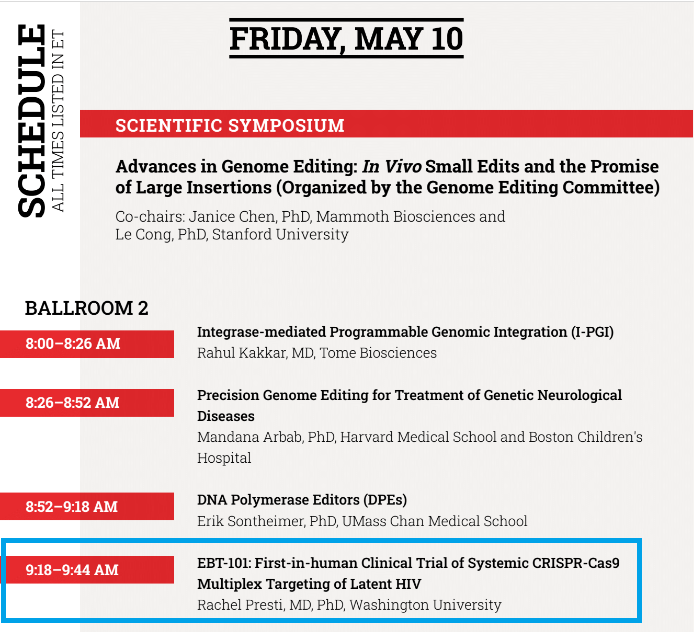CRISPR/Cas9: distruggere il gene CCR5 o l’HIV DNA integrato
Re: CRISPR/Cas9: distruggere il gene CCR5 o l’HIV DNA integrato
Leggo i titoloni sul Messaggero.it di questa roba, sono carico a spammarlo in giro ma prima voglio accertarmi. Vengo sul forum e leggo Dora. L’illusione è durata poco ma ho verificato una notizia e capito che le cose non stavano come la narrazione del sito del giornale.
Il punto che chi non è del settore penserà che il taglia e cuci a breve eliminerà la roba a tutti noi.
Il punto che chi non è del settore penserà che il taglia e cuci a breve eliminerà la roba a tutti noi.
Re: CRISPR/Cas9: distruggere il gene CCR5 o l’HIV DNA integrato
Ciao Dora, sei quantomeno speranzos* che questa possa essere una possibile strada verso la cura?Dora ha scritto: ↑mercoledì 20 marzo 2024, 19:14
Ci risiamo con l'hype sulle CRISPR: un comunicato stampa di un gruppo di ricerca olandese, secondo il quale HIV in cell culture can be completely eliminated using CRISPR-Cas gene editing technology, increasing hopes of cure, scatena i titoli dei giornali di mezzo mondo. Per limitarci a un paio di siti italiani:
adnkronos - Hiv eliminato da cellule infette con editing genetico: lo studio
Repubblica - Con le forbici di Crispr sparisce Hiv: sulle cellule funziona. Arriverà all'uomo?
Piccolo particolare: uno studio in vitro i cui risultati non solo non sono ancora stati pubblicati, ma saranno presentati a un congresso europeo, quello della European Society of Clinical Microbiology and Infectious Disease, TRA NON MENO DI UN MESE (ECCMID 2024, Barcelona, Spain, 27-30 April). E che neppure sono segnalati nel corposo - 108 pagine - programma preliminare del congresso, quindi arrivano come late breaker.
Quindi nessuno li ha visti, nessuno è in grado di parlarne. Tranne, ovviamente, i ricercatori che questo studio lo stanno pubblicizzando con tante fanfare e tanto anticipo.
Tra l'altro, questi stessi ricercatori dell'Academic Medical Center dell'università di Amsterdam, quattro anni fa parlavano di Extinction of all infectious HIV, quindi sono recidivi.
Non è così che si dovrebbe fare. Non è così che si dovrebbe parlare di scienza. Non è così che si dovrebbe parlare di cura di HIV.
Re: CRISPR/Cas9: distruggere il gene CCR5 o l’HIV DNA integrato
Certo! Io sono sempre speranzosa nelle possibilità della terapia genica.
Ci vorrà tempo e forse non sarà per tutti, ma i risultati arriveranno.
Grazie Mandrake! È rincuorante leggere messaggi come il tuo, mi fa pensare che i quasi 15 anni di impegno qui dentro a qualcosa siano davvero serviti.Mandrake ha scritto: ↑giovedì 21 marzo 2024, 20:30Leggo i titoloni sul Messaggero.it di questa roba, sono carico a spammarlo in giro ma prima voglio accertarmi. Vengo sul forum e leggo Dora. L’illusione è durata poco ma ho verificato una notizia e capito che le cose non stavano come la narrazione del sito del giornale.
Il punto che chi non è del settore penserà che il taglia e cuci a breve eliminerà la roba a tutti noi.
Re: CRISPR/Cas9: distruggere il gene CCR5 o l’HIV DNA integrato
Quello che mi fa sorridere di questi articoli è che non si accertano che certe “scoperte” non siano già state annunciate o siano al momento già in corso trial clinici per convalidare la loro efficacia
La genica su escissione è già in fase 1 condotta dalla excision biotherapeutics diretta da kamel khalili
La genica su escissione è già in fase 1 condotta dalla excision biotherapeutics diretta da kamel khalili
Re: CRISPR/Cas9: distruggere il gene CCR5 o l’HIV DNA integrato
Poiché l'articolo su STAT è dietro paywall, quello che segue è un articolo su BioSpace uscito ieri a firma di Tristan Manalac:
Excision BioTherapeutics’ attempt to use a CRISPR-based gene editing therapy to cure HIV has failed an early-stage study, according to several media reports on Friday.
Results from the Phase I trial of five patients showed that Excision’s CRISPR therapeutic did not strongly suppress the HIV virus. Three patients who were taken off of antiretroviral therapy soon developed viral rebound and needed to resume conventional treatments, according to reporting by STAT News.
Still, Excision’s approach did show signs of promise. One patient was able to keep the virus at bay for 16 weeks after stopping antiretroviral treatment before rebounding. Typically, HIV levels resurge after around four weeks. The experimental CRISPR treatment also appears to have lowered the number of infected cells in this patient, according to STAT.
In response to the disappointing outcome, CEO Daniel Dornbusch told STAT that Excision is “encouraged” by the safety data in the Phase I study, which suggests that “in-vivo CRISPR can be done in a safe way in humans.” The company will use these findings to work on a new gene editing candidate that it can apply to other chronic viral infections, such as herpes and hepatitis B.
According to its website, Excision’s lead candidate is EBT-101, a CRISPR-based gene editor that works by cutting out the HIV pro-viral DNA from all infected cells. The candidate is delivered via an AAV9 vector and uses two guide RNAs that can home in on three target sites in the HIV genome, minimizing the likelihood of viral escape.
The company is positioning EBT-101 as a potentially curative treatment for chronic HIV and is “rapidly advancing toward clinical trials.”
In October 2023, Excision released safety data from its first-in-human Phase I/II study of EBT-101, showing that there were no serious adverse events or dose-limiting toxicities in all three patients that had been dosed with the gene editor at the time. The study found four mild toxicities that could be potentially related to EBT-101, though all were resolved without intervention.
The early data also showed that EBT-101 was present at detectable levels in the blood four weeks after treatment.
In addition to targeting HIV, Excision is also leveraging its proprietary CRISPR-based gene-editing platform against herpes 1 and 2, for which it is advancing EBT-104, and hepatitis B, for which it is developing EBT-107.
Several biotech companies have responded to the HIV crisis, including industry powerhouses Gilead and GSK. Gilead owns the oral antiretroviral pill Biktarvy (bictegravir/emtricitabine/tenofovir alafenamide), while GSK and partner ViiV Healthcare market the oral pill Tivicay (dolutegravir) and long-acting injectable Cabenuva (cabotegravir/rilpivirine).
While these virus-suppressive treatments are effective, a true cure remains elusive and the field continues to face several substantial challenges. In March 2024, the World Health Organization warned of a growing virus resistance against Tivicay.
Meanwhile, gene therapies which have strong curative potential still pose potential safety concerns, particularly unintended edits and off-target effects.
Re: CRISPR/Cas9: distruggere il gene CCR5 o l’HIV DNA integrato
Segnalo articolo fatto abbastanza bene che spiega meglio la situazione:
https://www.aidsmap.com/news/may-2024/c ... al-rebound
Il passaggio fondamentale è questo:
Excision is now testing a higher dose of EBT-101 in a second cohort and is exploring new CRISPR delivery methods that might be more efficient than the adeno-associated virus vector. One possibility is lipid nanoparticles like the ones used to deliver messenger RNA in COVID-19 vaccines.
Insomma qualche debole speranza c'è ancora.
https://www.aidsmap.com/news/may-2024/c ... al-rebound
Il passaggio fondamentale è questo:
Excision is now testing a higher dose of EBT-101 in a second cohort and is exploring new CRISPR delivery methods that might be more efficient than the adeno-associated virus vector. One possibility is lipid nanoparticles like the ones used to deliver messenger RNA in COVID-19 vaccines.
Insomma qualche debole speranza c'è ancora.
Re: CRISPR/Cas9: distruggere il gene CCR5 o l’HIV DNA integrato
Ho letto l'articolo che determina il fallimento di tale terapia, il farmaco non riesce a raggiungere tutte le cellule infette, si sa il motivo?
Altra domanda, se riuscisse a raggiungere tutte le cellule infette la terapia avrebbe successo?
Grazie
Altra domanda, se riuscisse a raggiungere tutte le cellule infette la terapia avrebbe successo?
Grazie

